I came into contact with Brian Vocal Terror long ago during his Watchmaker days, and we've kept in touch on and off over the years. Always down to nerd-out about metal, Brian has hipped me to tons of absolutely killer music along the way, so we'd been planning an in-depth discussion about his musical background for some time—especially now that he's back in action—alongside John Heidenreich—in an equally ripping new duo called Annihilust. Brian and John each have long and healthy histories in the Boston metal scene, so it was decided that both would tell their tales. Let's kick it off all the way back in the mid-'80s, shall we...?
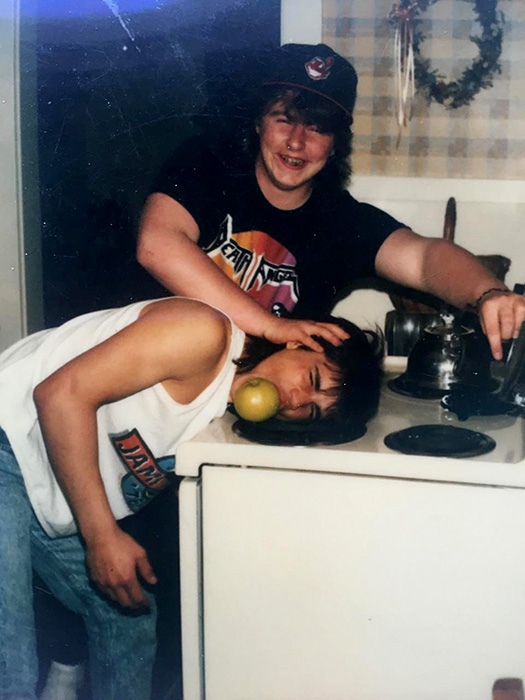
I have to begin by laying some groundwork here, because you guys have interesting histories in the Boston area metal scene. Brian, we'll start with you. You came up in the quirky crossover thrash act Ladybug Smashers; alongside killer underground, demo-only bands like Formicide, Temporary Insanity, etc.—as well as being friendly with the earliest incarnation of Anal Cunt. What's the "CliffsNotes version" of the Ladybug Smashers story?
Brian: When I was 13 years old, a friend and I used to have a fictional, non-musical band that was (now regrettably) created solely to ridicule my older sister's taste in music—which was U.K. fashion punk such as Siouxsie and the Banshees, Nina Hagen, The Alarm, etc. We naïvely thought that "The Ladybug Smashers" would be a name that a U.K. fashion punk band might have, and we'd do mock interviews talking about our hatred of all insects. In hindsight, we were way off with that parody attempt; but I entered high school later that year and desperately wanted to be in a thrash metal band like Metallica, Anthrax, and Slayer, and for some inexplicable reason the Ladybug Smashers name held on. I couldn't play anything, so I needed to find musicians of some kind to help me realize my vision. Singing seemed like an easy way out of learning and paying for an instrument—plus, writing the lyrics and creating the artwork would be an outlet for whatever counted as humor in my 13-year-old brain at the time. Since I already had the name picked out and logos drawn, it was only a matter of meeting the right people and convincing them to join a band called Ladybug Smashers.
This was not an easy feat in 1986 suburban Boston. Or anywhere, for that matter. I thankfully met Paul Vaughan (later the guitar player of Watchmaker) and Paul Travers while playing lacrosse in the spring of 1987, and it just so happened that those guys turned out to be two of the maybe five people into thrash in the whole city of Waltham, MA, where we grew up. The three of us immediately became great friends and exposed each other to a whole world of new music. I remember hanging out at the Travers' house listening to Napalm Death's Peel Sessions, just being blown away completely. I recall Paul saying, "Where can music go from here? This is as crazy as you get." And to this day, I fully agree with that statement, and I do not think anyone has topped that release. For me, that was, and still is, the bar.
Around this time, Mario Travers (Paul's older brother, who now plays in Raw Radar War) told us about a funny band from neighboring Newton, MA that was playing the Brandeis University radio station named Anal Cunt. The four of us went up to WBRS to see Seth, Tim, and Mike absolutely lay waste to an empty radio station lobby. Lloyd from Eye for an Eye was there as well, but that was it. Ironically, Lloyd was one of my sister's punk friends, and he was always incredibly cool to me despite me being down on my sister's music for some reason. But back to Anal Cunt, who was pivotal in the Ladybug Smashers' existence. Seth's performance that night absolutely opened my eyes to what could be done musically on no budget, little talent, and total conviction. And not to say Seth was not talented. Nobody could scream like that guy, now or then, and he was an amazing guitar player as well as a total comedic genius. But it was just the genuine "Who gives a fuck?" attitude that I walked away with that night. Everything about them was just "fuck it," from the three strings on Mike's guitar, to Tim's bare bones drum kit, and their homemade "Monsters of Shit" tour shirts. They just legitimately did not care, or at least did not care about the things "real" bands were supposed to put great emphasis on. It was all conviction. Seth would jump up in the air as high as he could, come down straight on his knees, and then wrap himself up in the mic cord while rolling manically on the ground, pulling the mixing board off of its table repeatedly—all while shrieking his head off at insane levels of intensity. I had never seen anything like that before. Seth and Tim were incredibly friendly with us after that show, and both of those guys mentored me in all things metal/hardcore-related, especially in the area of performance. Without their guidance, I would not be who I am now musically.
After that Anal Cunt show, we immediately found a drummer who could play fast and just began writing a bunch of Anal Cunt-styled songs mixed with thrash riffs, all about killing bugs. Our first drummer was not even into metal, but was a friend of ours helping us out. Like Hellhammer, we were desperate for drums, so we needed to convince anyone we could to be in our band. But musically, one riff was enough for a song, and then it was off to Anal Cunt noise territory until we tired ourselves or got bored. On to the next one-riff song! We recorded a terrible demo and sent it to Wicked Sick Records, Seth's label at the time. Seth liked us the way he liked Damien Thorne and Thor, if you know what I mean, and sent me a typewritten letter stating, "If you get signed to Wicked Sick Records, you will be fortunate enough to be on the same record label as Anal Cunt, Satan's Warriors, Shit Scum, and Nose." Awesome.
In 1989, we got to play the same radio station lobby where we saw Anal Cunt, and Seth and Tim were there to support us and participate in our set. This was our second show, so we were off to a good start! But as time went on, we got more musically proficient and became a legitimate thrash band, and Seth disowned us after that. Not as people, just as a band, and thus the Wicked Sick release never happened. The "new" stuff just wasn't his thing. We added a second guitar player, Pat Tapia (now also in Raw Radar War), as well as a drummer who actually loved metal, Mike Garrett (Watchmaker's drummer for all of our recordings). So, now our sound was actually technical thrash, if you can believe that. We recorded a very professional-sounding five-song demo with Hank Von Decken of Metal Blade's Nevada Beach fame at his Dizzyland Studios. Hank Decken is not a metal guy anymore, so he ditched the faux "Von" prefix to his last name, but that shit is great, so I am leaving the "Von" in.
After having unearthed and re-listened to both of these drastically different musical periods of the Ladybug Smashers after almost 30 years, I have to agree with Seth. The older, less together material really had some kind of dirty edge and naïve enthusiasm which the later era songs lacked. However, the later material is some of the most solid thrash I have ever been a part of, technically speaking, and it was just as fun to play, as our songs got more bizarre subject matter-wise. "Bison of Doom" and "I am a Plant" are good examples of this. It wasn't meant to be, though, as we abruptly broke up due to some petty, high school shit; but we played some killer shows and met some amazing, lifelong metal friends before calling it a day. I think our last show was with Cardinal Sin, Temporary Insanity, and Biohazard. Or maybe with B'zrker and Maelstrom? Not sure, but great times were had in that band, despite the stupid breakup, which I will take my full share of responsibility for. Thankfully, I am still friends with all of the old members, and we have all accepted "high school bullshit" as the reason for our demise, which nobody takes personally anymore.
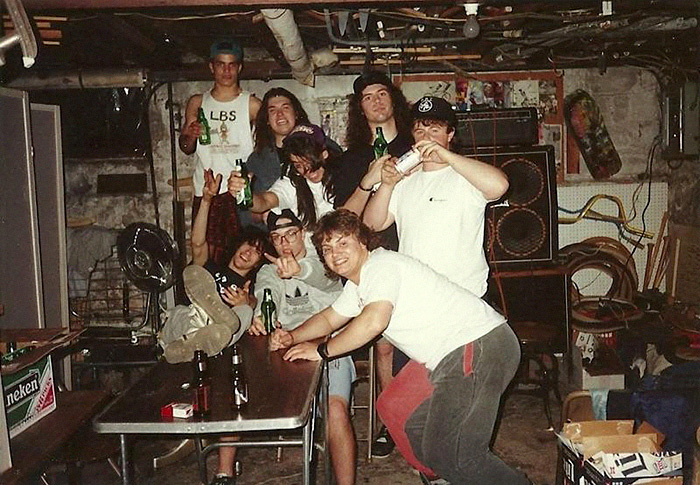
I feel like you could write a book with all of your fond memories and wild tales from those days, but what are a couple of the reminiscences that really stick with you the most?
Brian: I think I got ahead of myself on the last answer! That response certainly was a book! You nailed it, though. What sticks with me the most is definitely the friends I met during those early years, and the great shows. We were just awkward and weird outsider kids who were total misfits in our high school. The shit we got for wearing Metallica shirts was just astounding... Metallica, for fuck's sake! So, to make true friends with similar interests, regardless of age, was incredible. Most everyone I had met and made a connection with back then, I could see now and it would be like no time has passed at all. Wonderful people. Glen from Temporary Insanity, Keith from Wrecking Crew, Kevin Stevenson from Formicide/Only Living Witness, all of the guys in Demise/Experiments in Fear and Deslok, Atomicaust, B'zrker, Chris from Valhalla, Dave from Hearing Impaired, Greg from Subjugator, all of the guys in Split Decision, Terry from Afterbirth/Spasm/Disrupt/Grief, Charlie Infection, Jonah Jenkins/John/Dan from Look Again fanzine. Man, I cannot name everyone. Just so many great guys. The environment was just perfect for socializing.
At the time, Boston was an amazing place to see both hardcore and metal shows alike. Despite what people who wrecked the Boston scene in the mid-1990s claim, there was no Nazi skinhead problem, nor was there any gang violence of any kind at shows. Even Biohazard, a band who made a gimmick out of how tough and hard they were, used to say what a great thing we had going on in Boston, and it was true. I weighed 135 pounds and had a mullet back then, but was very outgoing and used to have a killer time thrashing and moshing at every show I went to. So, if I could go to as many shows as I did and get out of it not being hospitalized, anybody could. I was not a special case. So, anyone claiming that there was some kind of environment of desperate danger that needed rescuing is full of shit. Why people in crews and gangs cannot fess up to the fact that they just enjoy kicking the shit out of people, and not justify their violence with some bullshit answer, is beyond me. There were isolated violent incidents, certainly. As with any great pit, I may have gotten a fist or an elbow to the face by someone I irritated unintentionally. You bump into someone the wrong way that you do not know, that sort of thing happens. Purely collateral damage. But that was always an occasional one-off, which happened rarely. There were never any of the mass group beatdowns that seem to have been commonplace after I moved away from the Boston area in 1991, when I went to college in western Massachusetts. That was such a shame.
I cannot stress how cool Boston clubs were pre-1991. There were so many legendary shows that you would have to pick and choose which ones you could go to, as you just did not have the money or the time to go to them all. No exaggeration, you could probably see a show five days out of each week if you really wanted to, and you could go to any of them by yourself without fear of getting the crap killed out of you—with the added bonus of meeting at least one or two new friends that you would be sure to see at the next show. Sometimes you would make new friends just waiting in line to get into the show. You could just show up and thrash and have the best time of your life. Metal shows at the Paradise were rad. The first Nuclear Assault and Wrecking Crew show I saw there was crazy. I remember that stagediving was such an accepted part of the show in those days that the skinhead bouncers used to be like workers on a water slide, letting one headbanger stagedive at a time. Like, "Next. Next. Next." Kids lined up by the dozens! A sight not to be seen ever again, I am sure. Christ, I have not stagedived in eons. Nothing like that on Earth.
I've asked this of others in the past, but I'm just so fascinated by how many incredible bands from Boston and the surrounding region (most of which you introduced me to) never had the opportunity to really get out there and record a full-length album—despite being significantly better than some of their local contemporaries that did! Do you have any insider's perspective on why so many of these extremely talented groups just never made any waves?
Brian: Formicide and Temporary Insanity were two of the best thrash bands I have ever heard. I may be biased because they also happen to be great people and were present during a very important and impressionable time in my life, but I do not think it is just that. Anyone from outside of that time and place that I play those bands for gets floored. So, I just did not get it then, and I do not get it now. Seriously. Please listen to "Frozen Death" or "DSH" and tell me that those songs are from bands that deserved to get passed over by labels (minor or major) in favor of a Meliah Rage. If you watch that American Hardcore documentary, Boston is rightfully all over that thing. If you watch the film Get Thrashed, Boston is not mentioned at all. That is a total embarrassment.
Although I knew of some killer bands from around here during the thrash years, I cannot fault the makers of that film for overlooking Boston as a slight of some kind. We really did have no thrash bands in the national spotlight, despite every huge band on the planet making stops here. I mean, really, who did we have that was signed to any record label at all? We had Wargasm, who had one album on Profile; and we had the aforementioned Meliah Rage, who had multiple albums on Epic. That is seriously fucked up. Wargasm was legitimate, but they were no Formicide, and they could not even have hoped to generate anywhere near the level of crazed intensity that a Temporary Insanity live set could. Pits used to break out in the fucking bathroom if "Arrogant Fuck" got played. And Meliah Rage was awful. I am sure they were great guys and all, but they were so fucking bad. I have tried to revisit their material in the hopes that my teenage self was wrong and that I passed on them for stupid reasons. Nope, they are as boring now as they were then.
And they were the band that got signed to Epic fucking Records. Shit, it just doesn't add up. Did they just have the best management on Earth? Who bought into this bar-band turned "thrash"? Someone sure did. Knightmare was on a label of sorts. So was Druid. Post Mortem and Executioner were on New Renaissance. Those bands are cool and all in a cult kind of way, but New Renaissance at the time was considered a fourth-rate label, despite what we now know, and none of those bands got any attention, really—even in the Boston area that they hailed from. Let's be honest with ourselves here: those bands kind of sucked, but it is cool to name drop them to show off your metal knowledge. Terrahsphere got picked up by New Renaissance, too, but that band was also a joke at the time. That is one band who aged incredibly well, though. Shit, they shred, and I will fully admit to being wrong about them. But, man, that singer and his endless in between song rants about aliens mixed with 16th century French nobility was hilarious. It was almost impossible to like them after you listened to him spout this nonsense off in a conversational demon voice for a whole set. Again, looking back, that sounds awesome, actually.
I almost forgot about Maelstrom. Taang! Records signed Maelstrom, who were absolutely jaw-dropping until they stopped playing metal, cut off their long hair, shaved peace signs into their heads, got a DJ, and started playing slap bass. They pulled this shit after getting the record deal, but before their album came out. What a horrible poop platter that album was. And this white funk garbage was created by one of the best thrash bands Boston had to offer? Cursed be Mother's Milk! Maelstrom was so good for maybe a year. I saw them with Jerry's Kids and the Hard-Ons once. And Corrosion of Conformity. But Maelstrom had their chance and they blew it. I don't know, it boggles the mind to this day. I do not know who was making the choices back then, nor why. Let us not forget that we had Siege and overlooked them completely as well, so that should tell you everything.
Ladybug Smashers folded in 1991, but your next band, Watchmaker, didn't get going until the late-'90s. Were you musically active in the interim?
Brian: As I mentioned earlier, I went to college out in western Massachusetts and the Ladybug Smashers had already broken up, so I thought I would start fresh when I got there. However, I went to UMass Amherst, which is a notorious party school full of dumb steakhead jocks, and that reputation is utterly deserved. I had made plans with at least three people to start metal bands (one of whom is now my brother-in-law), but just got so caught up in wasting my time living out the song "Terminal Preppie", I guess. I was an art major, but all I cared about was drinking and going to the gym. I ended up hating myself and absolutely loathed the person I became during that period of my life. What can I say? I just got sidetracked. Such a waste of time. I never stopped thirsting and listening to any and all metal and hardcore that I could find, haunting all the local record stores daily. And I did finish my degree while working full-time at night. So, it is not like I was a total waste product. Nor did I turn my back on who I was and what I liked. I just felt that my priorities were fucked up and I put too much emphasis on people and interests that did not deserve my time at all. Hanging out with jock shitheads (essentially becoming one by association) should have never been on my résumé, you know?
My last two years out there got better, as I moved out of the school area and really began going to shows much more often, and actually made some new friends in the local scene. Given, the western Massachusetts scene was primarily hardcore, but that worked for me! The metal landscape was dismal back then. Nothing but countless death metal clones and older bands that tried to play more rock 'n' roll stuff to keep up with that "Seattle sound." So, the newer hardcore bands were playing the closest thing to old thrash that there was. And I have always loved NYHC and youth crew bands, despite not ever being straightedge or being officially labeled as "hardcore," so this new scene was fun and rewarding at the time. And it took me away from jock town, so that was cool. But hardcore bands I remember loving during this period were Unbroken, Coalesce, Groundwork, Undertow, Threadbare, Integrity, etc. So much great new music was being made.
And then metal made a resurgence with black metal and Relapse Records. Maybe it was just the timing, but I credit both of those institutions with having a huge part in making metal exciting again. Again, it sounds stupid, but you really had to be there to know what I am talking about. I was stoked that there were new bands who were playing real metal again, and I wanted in very badly. So, after school ended, I moved back to the Boston area and put the band back together with Paul and Mike. I did not want to be in a goofy joke band, though. To me, especially at that time, there was nothing funny at all about metal. It was life or death. The name of the band Watchmaker was taken from the chapter in Alan Moore's Watchmen where one of the main characters destroys himself in a self-created accident, and then rebuilds himself to become the being he had always envisioned, essentially becoming a god on Earth. I was fascinated by this theory of personal reinvention, and all of Watchmaker's early songs were about that. So, although I took a long hiatus from actually creating music, all of that time was necessary to essentially grow as a person and gain some experiences which defined what Watchmaker was.
The core of Watchmaker were actually all bandmates in the Ladybug Smashers: yourself on vocals, Paul Vaughan on guitar, and Michael Garret on drums. Of course, by that point you were exploring a frantic form of hyper-intense, face-ripping, harsh, noisy, thrashing grind. The band's debut album title, Kill. Crush. Destroy., really said it all. How had you three landed on that same page of extremity coming off of your roots in more "traditional" thrash metal?
Brian: Watchmaker was simply every genre and style of hardcore, grind, and metal that we ever loved thrown in the thrash blender and then filtered through our rage and excitement of being pent up without an outlet for so long. But if you know Paul and I and our musical history and tastes, it all adds up. Paul and I were always outcasts anywhere we went, and were kind of always doing things wrong. Getting trashed in a car while screaming along wholeheartedly to Youth of Today's "We Just Might" is a good example of this. Wrong! Back when metal and hardcore were two distinctly separate entities, and that separation actually mattered, we were buying and listening to anything we could get our hands on, no matter the genre. There were no lines to us, and it didn't seem incorrect to explore anything that kicked ass.
I needed my new riff fix wherever I could get it. 7"s at the time were the way to get whatever aggression you were craving at a cheap price. We were lucky enough that Boston had incredible record stores in abundance, all with a huge supply of singles. I would starve myself during the week in order to save up enough lunch money to buy 7"s. I would happily trade a sandwich for a Chain of Strength record. At this time, 7"s were $2.50 to $3.00 apiece, so Paul and I would pool our money and go through the stacks—pulling out stuff based purely on the cover, the name, the label, who was on the thank you lists, whatever context clues would help. We'd then go home and have a blast listening to bands and sounds we had never heard before. We purchased Integrity's In Contrast of Sin 7" on yellow vinyl during one of these sessions. Long gone now, though!
So, Paul and I have always been on the same page. We love grindcore, youth crew, and good mosh just as much as Kreator, Overkill, Obituary, and King Diamond. And when we first formed Watchmaker, both Paul and I were on a steady diet of Discordance Axis and Acme, so that makes sense. Mike, however, is a thrash metal purist. Not because he is close-minded, that is just the way Mike was wired. And circumstances helped enable this. If I was out of the loop at the time, Mike was in a total bubble. His vinyl collection never changed, and he was seriously unaware that Sepultura had any releases after Arise. The dude still had Blood Feast and Odin LPs that he was spinning regularly. It was like time stood still for him after our band stopped playing. But I remember the look on his face after I exposed him to some newer metal and hardcore. He was excited and hooked and ready to thrash again.
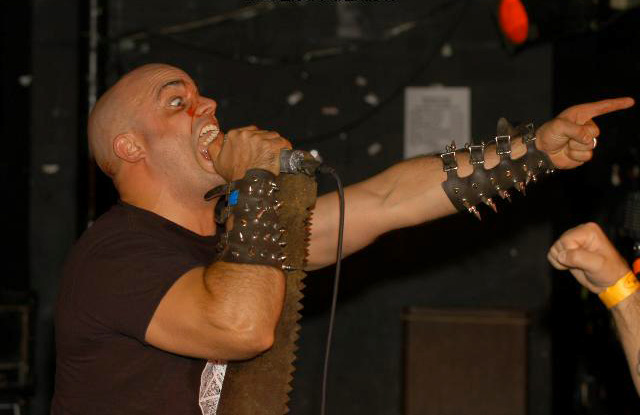
Your live reputation with Watchmaker fit the band's aesthetic quite well—bullet belt, over-the-top spiked armbands, and who could forget the crosscut sawblade mic stand!?
Brian: I was living the music I played, in that I was totally into our songs and the outlet it provided me. Our live shows were very cathartic for me, and I think it showed. As for my aesthetics, this was just a result of me being unashamedly who I am and voicing it with my music and in how I presented myself. I wanted the world to know that I was metal, my band was metal, that we championed metal, and that you should never dumb down who you are for anyone. Plus, I think spiked armbands, bullet belts, and leather look cool as hell. I just would not feel right taking the stage and performing in cargo shorts and a golf shirt. Paul did, though, and we were in the same band on the same stage. But that is Paul, and I will defend this as his strongest thrash metal personality trait, in that he purely does not care about image at all, more so than anyone I have ever met. And this is actually reflected in his guitar playing, where he is not hindered nor impaired by any doubt-filled, self-conscious thought or decision when he plays. He just channels shit and goes with it—which, to me, is both very impressive and very natural.
But back to aesthetics. Paul played a show with Mortician wearing rubber snow boots and a sweater. Why? Because he just shoveled his driveway and that is what he was wearing when we picked him up in the van. We played this squatter dive called the Loudhouse in Montreal with The Endless Blockade and Rammer. When we showed up, the gutter punks who lived in the club hated Paul on sight because of how unassuming and "suburban dad" he looked. Paul rightfully pointed out that he was far more punk than any of those guys, as they were there doing each other's hair, making sure that each spike was just so, and spending literally hours getting their image down, preparing for a gig that they were not even playing. What is punk rock about that? Look at old Black Flag photos. Those guys looked like homeless people. That is punk. But I see both sides. In their defense, those punks spiking their hair before the show did look pretty fucking cool when they eventually finished their coiffing.
I think, as with anything, aesthetics is subjective, and it basically all comes down to conviction. There are bands that take hours to get ready that kill, and others that suck, as it comes off completely forced. And there are bands that wear their street clothes and are totally epic, as well as others that are boring as hell. There is no set formula. Whether what you are wearing on stage works with the music or not is entirely in the hands of the people playing it. And I will still use the saw mic with Annihilust, just in case fans of the saw are wondering. That thing had more fans than we as living people did. If we were huge, that saw mic would have its own bus.
Watchmaker eventually hooked up with Willowtip for your next two full-lengths. I have to admit I've lost touch, but at that time it was one of my favorite labels. Still, Watchmaker was a bit of an odd fit with the type of roster for which Willowtip is most known.
Brian: Oh, yeah, at the time Willowtip was on fire! So much so that Earache—another once-upstart label that released nothing but gold early on—wanted to reclaim whatever it is they lost through releasing Willowtip bands. But we certainly were an odd fit. Watchmaker and Goatsblood. But we would have honestly been an odd fit on any label, and we were a far better fit on Willowtip than we were on Wonderdrug or Dreamcatcher. But I think that is what may have made Willowtip such a great label. Jason Tipton, Willowtip's owner and founder, simply worked with bands he liked musically, and therefore was operating from the position of a music fan, not a businessman. He obviously has great business sense, too—there is no way you could possibly survive and flourish for as long as he has otherwise—but his heart was always in the music, and that is why I think it worked. Both for his label in general, as well as in Watchmaker's relationship with him and the rest of the bands on his roster. But I know what you mean. We are pretty dirty sounding next to the rest of that catalog! Still, we got along great with any of our labelmates whenever we would play with them, and we had nothing but great experiences with Jason and his label. I loved The Dying Light, and it was so cool that Phobia got signed to Willowtip as well. Our second album on Willowtip got a joint review with Phobia's first on Willowtip, and I remember being honored by that. Rotten Sound were just menacing! Of all the bands on Willowtip, I think those were the ones we had the most in common with. But like I said, I appreciated the other bands, and it was always a pleasure to meet anyone on the Willowtip roster. Jason knew what he was doing, for sure.
As you mentioned, through Willowtip, you ended up having those albums licensed by Earache in Europe. What was that like? If nothing else, I suppose it was kind of fuckin' awesome to have that coveted Earache logo on the back of a couple of your records!
Brian: Oh, absolutely! Again, you nailed it. That logo just symbolized so much for me. On sight, that logo evokes such heartfelt memories even to this day. It was a teenage dream come true for Paul and I, who worshipped at the altar of Earache and would buy anything that logo was on. I would need to be a bit choosier with my Earache purchases after getting suckered by Mighty Force, or MOSH34. Given, I learned to actually accept that release and forgive them the money I thought I flushed down the toilet buying it, but it was after that purchase that I had to put a stop to the blind Earache purchases. And although Morbid Angel was incredible, the more death metal bands they started to sign, the less I was interested. Nocturnus came out earlier, but that was just not for me! And I did enjoy Entombed's Left Hand Path. At least those were metal. Mighty Force really made me jam on the brakes and rethink things. But those early releases and both versions of the Grindcrusher compilation were just the most exciting things for me. I saw Carcass, Napalm Death, and Godflesh on their first U.S. tours, and those guys did not disappoint. Those were some of the best shows I had ever seen. I would have loved to have seen Napalm Death with Lee Dorian, but alas, Barney was still good. Harmony Corruption was the last album I bought from those guys, though. Sorry, I digress, as per usual. But we were so happy to get a MOSH number. Damn, that was cool, and I do not care how fanboy that sounds. Earache is Earache, and if you cannot appreciate how important that label was, then you weren't there and do not know what the fuck you are talking about. If I went back in time and told my teenage self that he would be in a band on the Earache roster, his head would have exploded.
Speaking of legendary labels, Watchmaker actually attempted to get signed to Revelation Records via our publicist at the time, Jerry Graham, who had close contacts with them. That label was just as killer to us as Earache, but in a different way. The Slipknot on their roster (not the band from Iowa) was a huge influence on our sound. Not to mention all of the old stuff like Warzone and No for an Answer, all the way up to Burn and Quicksand. This was before Jason from Willowtip contacted us and we were shopping for labels for our second album. Revelation said we were too metal for them. I took that as a compliment, and after taking a quick peek at their current roster just now, I have to agree! Despite their history, I have not had the desire to make a Revelation purchase in ages. Still, it would have been cool regardless.
But without question, other than Combat, I cannot even think of another record label that had such an amazing and influential roster as Earache. So, from a fan's point of view, it was great. From a business point of view, it did not even matter, though. We never made any extra money off the deal or anything. Jason at Willowtip made that deal, not us. And Earache was totally cheap on sending us copies of our releases, which they were not paying us for anyway. I still do not have any copies of two compilations we appeared on that they put out. I did not even know about those until John told me this year. So, that logo and its connection to my past was all I really got out of the deal. I'll take it. I've had worse deals.
Now that I think about it, another thing about Earache, business-wise, that was a bit off-putting, but totally commonplace, is that they asked for my publishing rights to the songs. I refused, and as a result, we did not get the sweet video game licensing deals that some of our peers got. That is understood, as why would anyone spend time shopping around somebody else's songs that they are not going to see a dime of? So, I sometimes have regrets about not signing over the publishing of our songs to them, but I still hold on to the King Diamond/Metallica scenario. The King bought a Corvette straight up with the money he made from Metallica covering his songs. Can you imagine what Blitzkrieg makes in Metallicash? I am holding on to the dream that the next generation's Metallica will cover "Nuked to Ashes" and I will finally be able to buy that Corvette!
While working with Earache, however, I did get to connect via email with a guy who helped run Rise Above Records, who was also working for the Earache staff at the time and was lucky enough to be our handler, of sorts. I fanboyed out on him, too, as soon as I found out who he was, as the Dark Passages compilation was so killer. Those Cathedral songs on there are just nuts, and I still own that original CD to this day; as well as Penance, The Road Less Traveled. But I tried to get him to send me Spazztic Blurr cassettes and I did not even get those. It has been over 10 years and I actually still think about that! Dude! Send me the Blurr, now!
I feel like you once told me that Watchmaker's final split with Hirudinea, on Bestial Onslaught Productions, kind of flew way under the radar by comparison. That didn't have anything to do with the band coming to an end, did it?
Brian: We actually recorded the songs for the Hirudinea split prior to our last album, and long before we broke up. That split just took a long time due to all parties involved, including ourselves. Hirudinea and Alex Spina, the owner of Bestial Onslaught, are great friends of ours, and as such there was a very laissez-faire attitude about finishing it up. We just did not have any deadline at all. Plus, we were recording the songs ourselves in one of Paul's abandoned apartments, so we did not even have a recording schedule to adhere to or a fear of going over budget. Paul used to own this three-family house, and when one of his tenants moved out, Watchmaker moved in. Mike set up in the living room with Nick, while Mark and Paul were in the bathroom hallway. I was in the kitchenette. It was great. Just like the "Me and My Wine" video.
But, yeah, nothing happened with that split at all. And if I do say so myself, it had great packaging, and Hirudinea just destroyed on that. It's too bad it did not get more exposure than it did. And, yes, sometimes the finger was pointed at Alex for that, but if both bands are honest with themselves, how many copies would we really have moved anyway, even if Alex made it his life's mission to get this release heard by the masses? If you wanted the release, you got it. No amount of promotion would have changed the number of copies moved. Neither Watchmaker nor Hirudinea sell gold albums, so even if Alex spent a ton of cash on promotion and ads and in-store appearances or whatever, I still do not think that split would have sold much more than it did. I would have loved it if it sold well, of course, but that was just not in the cards, and it kind of fizzled deep into obscurity.
Out of curiosity, I would love to know how many copies of that CD are left. I do not even think copies were brought to our record release party show promoting that split. Killeveryone Records released the songs from that split on a Watchmaker [two-on-one] cassette, which also features our first album and a noise remix. And all of those songs are available digitally, too, so it is not like nobody can hear the music or anything. But as far as original pressings go, I only have one copy myself, and know very few people outside of the bands who made it that actually own one.
To answer your question about why Watchmaker broke up, all of the members just felt that the band had run its course and that it was time to call it a day. No drama or specific incident ended Watchmaker. I recently received an email from a guy in New Zealand who said he had heard that we broke up because I blew out my vocal cords and could no longer perform—like I use an electrolarynx to speak now. I wish we went out on something as epic as that! But we just felt the end closing in when we recorded our last album, which is why the album is titled Erased From the Memory of Man. I wanted a suitable name for what I knew would be the last release in our catalog.
We were all older guys with careers outside of music, and full-blown adult responsibilities. Watchmaker was always self-sufficient financially to where it wasn't a burdensome drain on any of us, but it simply became harder and harder for the five of us to be in the same place at the same time schedule-wise. And that spare time—which seems endless when you are younger—becomes non-existent once you start piling on the non-musical obligations—making any band activity, no matter how enjoyable, extremely stressful. We all simply agreed that it was our time to depart.
Lair of the Minotaur asked us to play our last shows with them, as they were playing the Northeast at the same time that we were actually vocalizing to others outside of the band about pulling the plug. We played our second-to-last show in Boston to a wonderful turnout of all of our supporters and friends. We then played our last show in Portland, ME, going out exactly as we went in: savagely playing as if our lives depended on it to a near-empty room of mostly disinterested people. John played drums for both of these shows, and our last song ever was a cover of "Damage, Inc."
John, you got started drumming for grinding death metal act Abhorred in the early-2000s. If you hadn't already crossed paths sooner, I'd imagine that you and Brian met during those years, as Abhorred and Watchmaker shared a few bills, correct?
John: That's right, Abhorred opened up for Watchmaker a few times, and all of us hit it off immediately with Brian and the other Watchmaker guys. Eventually, Brian ended up doing all of our artwork, layouts, as well as drawing up our band logo. Hell, Abhorred was started with only one real goal: to play a show with Watchmaker. This was 2003. Kill. Fucking. Everyone. had just come out. Watchmaker was one of the very few metal bands in New England at the time that didn't play generic death metal or metalcore, which was the dominant trend in the local scene back then. We were all basically indifferent to the brutal death metal clones, but we hated the metalcore bands. Absolutely fucking hated them. All of that stuff was terrible. So, Watchmaker was an awesome, legit band in a sea of awful garbage, and they were approachable and totally cool—as were just about all of the bands and people who we befriended.
It was through drumming with Abhorred that I met virtually every single band that I ended up working with later on. The scene in and around Boston back then was small, but there was a core of bands and people around that all had a similar attitude and mindset. If you put on any airs whatsoever, or were just slinging fake bullshit, you would definitely get called out—especially by the seasoned veterans that had already seen a million different bands, and had been around long enough to know better. And that was extremely valuable, because when you're a stupid 21-year-old, like I was, you sometimes need that proverbial kick in the ass to set you straight. People are utterly hopeless at that age. You think you know everything, but, really, you're just flailing around like a clueless idiot. The fact that any of us make it through alive is a fucking miracle.
By the mid- to late-2000s, you had kept pretty damn busy in a couple of rugged, sludgy hardcore/punk acts—Noosebomb (bass and guitar) and Slugpuncher (drums). What were those experiences like?
John: Noosebomb and Slugpuncher were both offshoots of Grief. My stint in Slugpuncher was short, a few months or so. Slugpuncher had great, great riffs. Silly premise—with songs exclusively about slugs—but, man, the riffs were stellar. That just fizzled out, unfortunately. My Noosebomb stint was longer, close to three years. We played a bunch of gigs in the Northeast. Also, we managed to record a four-song 7" for the Land O Smiles imprint, with John Farley (ex-Abhorred vocalist) and Jeff Hayward (ex-Grief vocalist) on dual lead vocals. That was an excellent lineup. And god damn, the band sounded great live, but I'm not sure if it ever got a truly fair shake. It was kind of the bastard child that no one paid much attention to. The Brain Food for the Braindead album—which was released a little over a year before I joined—is a really good album, very underrated. Towards the end of Noosebomb, right before I left in 2008, the band was beginning to mix more hard rock and classic heavy metal elements into the sound. Our AC/DC, Kiss, and Iron Maiden influences were shining through a lot more. It was really starting to become its own animal, instead of just purely an extension of the sludge/hardcore sound.
I'm not clear on the chronology, but around that same time you ended up playing drums for Watchmaker, too.
John: Yeah, I was aware that they were having drummer issues, and either Brian or Paul approached me and asked if I'd be interested in filling in. This was early-2007. Total no-brainer! I think I said yes before they even got done asking [laughs]. Even though we only played a couple of gigs, it was fucking great to run through that set list—just song after song of crushing insanity. As a fan, getting to watch the band play from behind the drum kit was damn cool as well. Mark Kevorkian and Brian made one hell of a live tandem. Watchmaker really came into its own when Mark joined the band. His riffs and stage presence were a perfect match for them. Those who were there to witness know what I'm talking about!
To top it all off, you also toured on guitar with Grief—appearing on 2006's Alive, released by Southern Lord, and sticking around until the band broke up in 2009. What was it like to be a part of such an iconic group?
John: Believe it or not, for a band with so much dead serious lyrical content, there was lots of hilarity. Whatever preconceived notions people might have about Grief, there were times on the road that I would literally be in tears from laughing so hard. As soon as the band got in the same room together, the collective IQ fucking plummeted. Just pure stupidity. It's very possible that a few people who were expecting brooding, ultra-serious doom metal messiahs were extremely disappointed [laughs]. It was really interesting to see the loyal, diehard cult following that the band has. Some of those fans probably know more about the band than the band members themselves do. There are more than a few people out there with Grief-related tattoos who know literally every word to every single song. That's something I was aware of, but it's something else entirely to see it in person. Surreal.
In all fairness, my stint in Grief was relatively short. I joined in late-2005, the band broke up (for the second time) in mid-2006, reformed in mid-2008 for a European tour, and broke up for the third and final time in early-2009. So, I was only in the band for a little over a year total. Really, I was just a hired gun—a live session guy, more or less. It was basically, "Here, learn these songs," and off we went. And the band sounded absolutely killer live. Some of the best shows I've ever played with any band. But, all things considered, the classic lineups from the mid- to late-'90s were the band at its peak. In the long run, that period of the band will probably be remembered and talked about the most. One of the best shows I've ever witnessed was the reunion of both classic Grief lineups in 2005.
At what point later on were you drumming for Trap Them? How did that experience differ from the types of bands you had worked with prior?
John: Trap Them guitarist, Brian Izzi, approached me at a show in late-2006 and asked if I'd be interested in playing drums on one of his new projects. At the time, I only knew of him through December Wolves, another underrated New England band. Completely Dehumanized is a great record, by the way. Anyway, the first Trap Them album wasn't even out yet, but it had already been recorded. So, this was another situation where it was, "Here, learn these songs," and away we go. It seemed promising at first, but the sound and attitude of the band wasn't something I could ever completely buy into. That Converge style of hardcore has never been my thing, I just thought it would be cool to work with the guitarist from December Wolves, a band I really enjoyed. If it was more like Siege or early Black Flag, then, yeah, I'd have been way into it. And I know Izzi is a massive fan of underground death, thrash, and black metal, so at the time I didn't completely understand why a lot of those influences were being downplayed or pushed aside. More importantly, there wasn't much camaraderie. It was a strange situation to be in. A band should be like a bunch of pirates and outlaws with a common rallying cry, and this was like the total opposite—at least when I was around. So, I left after only a few months, sometime in mid-2007. It was an amicable split, there weren't any fights or stupid bullshit like that. We all got along fine, but it only took a few shows before realizing it wasn't a good fit and it was time to move on. Not to mention, I was already playing in at least three or four other bands at the time!
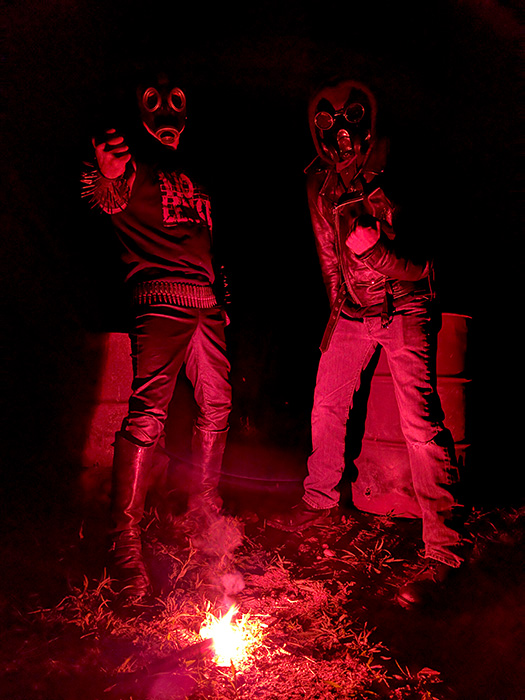
That finally brings us to the task at hand: your fierce new duo, Annihilust—formed in early-2015. What brought you back together to work on relentlessly vicious, grinding metal again after all these years?
John: Well, we had always kept in contact for the most part. It was after I asked Brian if he'd like to draw up some artwork and a logo for another band of mine that we began contacting each other with more regularity. The Annihilust thing came about naturally, though. I'm not sure we ever had a real plan, it was more a case of us getting together and seeing what happens. We easily could have just met up, started drinking, and never come up with a note of music! Just an epic drinking binge shouting at each other over thrash metal cassettes blaring on the boombox. Luckily, we didn't have any problem coming up with material! Anyway, speaking for myself, this is the kind of music I've been wanting to do since I was a teenager. That has never changed or gone away. There are people that go through phases and grow out of metal, whatever, but I've never understood or related to that mindset. It makes absolutely zero sense. Fuck, I probably have an even greater appreciation for this music now than I ever did in my teens and 20s. Albums like [Terrorizer's] World Downfall, [Merciless'] The Awakening, [Dark Angel's] Darkness Descends, etc., these kinds of albums are nothing short of life-affirming. Stuff like that is always gonna be in the rotation, no matter what.
Brian: Very well said! This band just happened naturally through our chemistry and friendship, and the music happens the same way. I had been musically inactive for almost a decade, and as such, I was totally hungry for this and was so stoked to get something going again. Especially something of this caliber. I needed to do this. And I feel like I have finally taken everything I have learned from all of my past musical experiences and put it to practice here, with someone who has the same drive and hunger as I do. The music we are playing is, as John said, the music I have always wanted to play, as I feel there is finally a very healthy balance of both my thrash and grind roots. The band John asked me to do artwork for was his project, Besieger. It was only John on guitar and vocals and another guy on drums. I was so impressed with John's songs that I think I embarrassingly offered to sing for them at one time. If I did not say it out loud, I certainly thought it! After Besieger ended, that is when we talked more seriously about doing something new to both of us. We were just shooting the shit about old metal bands on the phone and John just directly asked me what I was up to and if I wanted to sing again. We met up shortly afterwards at my house in New Hampshire. John brought a mic and an ESP King V, and we then proceeded to have a day-long thrash session in my living room, where we recorded a ton of raw riffage and screams. As John said, it could have went the way of an all-day metal hangout, but we were on that day, for sure!
What does your writing and recording process look like? Together? Separate? In-studio? At home?
John: There was one marathon writing session up in New Hampshire during early-2015. Now that I think of it, we basically mapped out the song structures for the entire EP in one day, which is nuts. And there is definitely some unused material from that session that'll probably show up later on down the road. After that, it was just a case of emailing instrumental demos back and forth to each other until the songs were totally fleshed out. We live nearly 100 miles away from each other, so getting together in person can be a hassle. I think we managed alright, considering. We did finally get around to finishing this EP without killing each other, sometimes that's all you can ask for!
Brian: Right, even now, we are doing this interview in three separate locations! I take none of this for granted. Doing this kind of band in different states would have been an impossibility not so long ago. Now, we can email each other files back and forth and share ideas effortlessly. We can also access each other's ideas and concerns at our own leisure, when we have the time to do so, which helps tremendously with the stress factors that usually break bands up. Both of us have done this before with many different types of people, and we are not going down the same breakup over intrapersonal bullshit road again. Yes, I would love to thrash out live in the future, but right now, this is fantastic and I think the results speak for themselves. But the writing and recording process is as follows: John and I thrash out without drums. He plays riffs and I scream nonsense over said riffs, just to get a feel for where the song will go. John brings pre-written riffs to the table, but often goes into something new based on what we are doing together. The session is recorded, and then John takes the session home and splits the material up into what he feels are useable tracks. Once he nails a song structure, he then records drums and more guitars and sends me the rough tracks. I come up with the song names and write the lyrics, then record scratch vocal tracks. John then refines the music further and I do a final vocal track. The vocals on our debut EP were recorded in my shower. Thrash at a distance!
Annihilust's first recorded output saw the light earlier this year via an appearance on the Yamabushi Recordings Cleanse & Purify compilation, which kind of came about out of nowhere...
John: I'm not sure what Yamabushi was thinking having us on their compilation, but I'm glad they weren't afraid to squander their reputation by working with us. All in all, that takes some real guts. And for that, they have my unending respect. I can only imagine how much hate mail they must be getting now. We probably should have let them know what they were getting themselves into.
Brian: Yamabushi is a great label. They are true artists in that they hand-create all of the packaging to all of their releases and put great care and craft into what they do. Anything you get will be jammed with inserts and stickers. You know, like the old days. And their bands kill. Aaron from Cease to Exist (U.K.) was my contact there. He and I began chatting via email as a direct result of an Aversionline review of the first Watchmaker cassette. We hit it off immediately, both on a personal and musical level, and then it was not long before we were working together. I have been doing artwork for another one of his bands, Ewige Schlangenkraft, and Annihilust has a future split release planned with Cease to Exist. But because Aaron and I developed an instant rapport with one another, I began sending him our tracks before they were done. He asked if he could put one on his compilation, and we were thrilled to say yes. The compilation looks amazing, and it is as eclectic as you get music-wise, which is perfect for us. If you are into underground music regardless of genre, then this is the compilation for you.
Brian, that compilation also featured an old project of yours and Watchmaker guitarist Paul Vaughan's called Breakfight. What's the story there? You had told me that the two of you may even resurrect that project at some point?
Brian: Man, I am so surprised that Breakfight still has traction! And so is Paul. I remember calling him and telling him that the Breakfight song we recorded maybe 12 years ago is being put on a compilation. He told me that was the last thing he ever expected to hear from me. Breakfight being on the Yamabushi compilation was a result of what I mentioned earlier, in that I would just send Aaron tracks of rare Watchmaker stuff, as well as songs from odd projects that nobody ever heard. Breakfight was something that Paul and I did with one of my former coworkers, a Jamaican guy named Sacha Moo. All of us were into old, primitive electro hip-hop, and we wanted to make a grind version, paying tribute to the sounds created by the likes of Afrika Bambaataa and Newcleus. Or, as Paul has said, "Deicide meets The Egyptian Lover." Sacha is long gone, but Paul and I thought we could do this type of project at a distance. So far we have not come up with a single new song! Maybe sometime soon a Breakfight full-length release will be a reality. But for now, all we have is that one song. Oh, and if you have not heard of The Egyptian Lover, please search for his song "Egypt, Egypt" and get your ass beat with a Roland. The guy is unstoppable. Now, put crazed shrieks over that using outdated breakdance hip-talk, and you have Breakfight.
The newly-released EP, On the Brink of Annihilation, was mastered by the legendary Don Fury. I know you traveled to his studio in Troy, NY to work with him directly, and that he was pretty psyched on it. That must have been a mind-blowing experience!
John: The advice Don Fury gave to us was invaluable. You listen to a guy like that talk for just five minutes, you're gonna learn something. His stories and anecdotes are endless, he could easily write a book or two chronicling his life and work. But aside from his extremely helpful advice, Don is a machine. Unbelievable work ethic. Works all day straight through without more than a few minutes break. By the end of the day, after we were finished mixing, I was wanting to keel over and fucking die, but Don seemed just fine.
Brian: As a music fan, meeting and working with Don was a bigger thrill for me than being on Earache. But with Don, the reality of working with him was better than I could have imagined, as opposed to the empty relationship I had with Earache. Don's name was on most every old hardcore album I grew up screaming to, and he is responsible for an important portion of the soundtrack to my youth. Ironically, two of the first three 7"s I ever bought had Don's name on them—Madball's Ball of Destruction and Sick of it All's Revelation 7"—while the other 7" was Napalm Death's Mentally Murdered on, yes, Earache. But back to Don, his name is as synonymous with NYHC as Vinnie Stigma's is. His rich history in music goes way beyond that, though, and, like John said, you learn so much from him just hanging out and conversing. Whether it be regarding recording techniques, or simply funny personal stories about Into Another and Madball.
Don has been doing this for decades, and for him to still get enthusiastic about spending hours listening to random guys scream over loud music, shows that he truly loves what he does. We were only down there for a day, and it was the most constructive and rewarding recording experience either of us have ever had. As soon as we first shook hands, I just knew. This is a good fucking guy. He is incredibly positive and supportive, even when being critical, as he truly wants you to get the most out of your songs. His work ethic is tremendous and you are in his home as well, so he is extra hospitable. And he built and designed everything in his home and studio himself. He even makes a great iced coffee. Look, not to gush here, but very rarely do you meet a guy who turns out to be all he is rumored to be. Don is this and then some, both personally and professionally. I cannot say enough good things about him, and I cannot wait to record a full-length album in its entirety at his studio. Meeting Don Fury... yet another thing I must time travel and tell my teenage self about to watch him implode with disbelief. And this is all due to No Echo and the feature Carlos did on Don. Thanks, guys!
Brian, as with Watchmaker, you handled the superb cover art for the Annihilust EP; as well as having previously provided comparable illustrations and/or design for bands like The Endless Blockade, etc. What's your artistic background?
Brian: Thank you! I am happy you appreciate my artwork! That is such an important part of any release in my opinion, and when John and I started Annihilust, we wanted to have the complete package: great songs, great artwork, and killer photos! We wanted all of our releases to be like the EPs of old, like [Sodom's] In the Sign of Evil and [Metallica's] Jump in the Fire. Releases we would buy based purely on cover art, even if we never heard the band. I have been exposed to many great (and terrible!) bands this way. But I have just always instinctively been driven to create graphics. Even when I was a kid and wasn't in a band, I would make layouts and logos for my own cassette mixes or homemade posters for bands that did not have any for me to buy, like the Crumbsuckers. In 8th grade, I made my own Slatanic Wehrmacht notebook. Damn, that thing was cool. I want one of those now!
Back to my background, I do have an art degree, but I do not think I gained anything from attending art school, except massive debt, which I just finished paying off. I learned more about design and composition when I was a kid—glue-sticking letters and photos together and painting with white out—than I did in any of the classes I paid up the ass for. And keep in mind, I went to a state school. But I was just as creative before school, and much more creative after leaving school, mastering techniques I discovered on my own. Like music, I feel art is all conviction. Sure, knowing theory can help you realize your vision in a more professional way, but I think drive and desire far outweigh technical skill, always. And I never felt like I needed a professor to help me express my ideas. So, yeah, the degree helps me on a résumé and all, but I have not been job-hunting for over 11 years, so I do not even see its use there anymore.
I now work for a litigation consultation firm. I make graphics and animations for use in very high-stake trials for very large corporations. Mostly intellectual property stuff in the high-tech arena. My job is rewarding in that my graphics are used for combat purposes and have a goal beyond simple aesthetics, with results that are real and impactful to all parties involved. There is something to that, even if I am not making the preferred living of painting skulls all day long. So, the work I do for bands is still my favorite, despite it not paying for shit. My music art pays in other ways, though, and I am always psyched to do a new logo or cover for a band. It is just more childhood dreams come true. That is the theme of this interview, for sure!
On the Brink of Annihilation is currently available digitally, but I know there's been some talk of a potential cassette release through your own Killeveryone International label. What's the status there?
John: Even though I'd really prefer to release this on vinyl, it's expensive as fuck to press records. Plus, it takes fucking forever to get them made, just months and months of waiting. Cassettes have a way faster turnaround, and they're cheap. And they don't take up as much space. So, there is a very good chance there will be a pro-pressed cassette release of the EP by the end of the year, at least. Of course, vinyl and CD releases are definitely possible, especially if enough people start complaining to us!
Brian: Cassettes are just perfect for us, as most people do not buy physical releases anymore anyway. So, we might as well release something physical that is not only a tribute to our past, but is also very affordable and cool as hell. Nothing comes close to the low price of making cassettes. And that is the format I was initially exposed to metal on, so tapes are still viable to me. Plus, we will always include the digital tracks with any tape sale, so you get the best of everything. Like John said, though, we will press our releases on any format so long as it can pay for itself. We are too experienced to commit financial suicide over any of our bands or musical projects. There will be plenty of physical releases, it will now just be a question of when we can afford to produce them. I cannot wait for vinyl. I must have a gatefold LP one of these days.
I realize that it's stupidly soon to ask, but it's a good way to close, so... what's next?
John: We already have a couple of demos recorded for a split release that has yet to be officially announced. And we're compiling riffs for a possible full-length LP, but there are no concrete plans for that yet. Playing live is not something I even really considered for Annihilust until these songs started coming together. If we can find people who are on the level—personally, musically, all that shit—then, sure. One thing I can guarantee is that if and when we do perform live, we will absolutely destroy and lay fucking waste to any venue that will have us. We will be killing it at any cost. Get ready!
Brian: Our split and eventual full-length are what we are shooting for in the near future, regardless of a live lineup. As John said, if we can find the one missing link to complete our live lineup, then we will be out there on stages killing as soon as we can. I miss thrashing live, and cannot wait for that to happen. But the right person has to present themselves. As I said earlier, we are both too experienced to deal with typical band shit. I do not want to manage another adult's schedule or life. I do not want to babysit anybody and keep them out of trouble. I do not want to have to talk someone into being in this band. I want someone to willingly join the fray and destroy with us. Fast drummers, apply here!
***
Annihilust's On the Brink of Annihilation is now available digitally through Bandcamp. Email [email protected] for additional information, or to shoot the shit about underrated New England thrash metal!

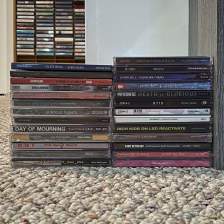
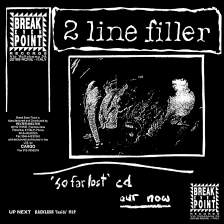
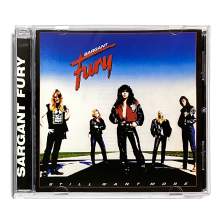
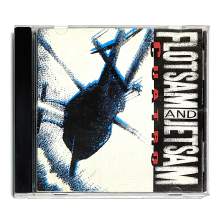
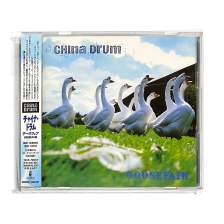
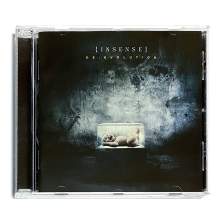
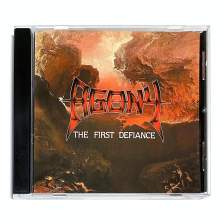
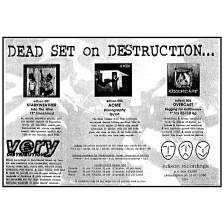

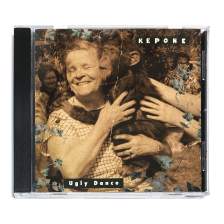
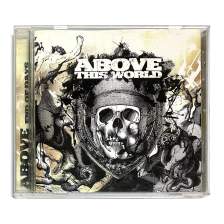
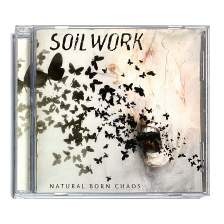
Comments
As much as I love Maelstrom’s “Step One” . . . I even ordered one of their shirts from Taang back in the early 90s . . . that “Inner City” track on youtube is a fucking beast.
Speaking of the shirt, Curtis Casella put a hand-written note in the package, basically saying enjoy the shirt and thanking me for ordering all the way from Liverpool in the UK. Many, many years later Gang Green toured over here and after the gig me and my brother found ourselves in a surreal moment chewing the fat with Bob Cenci and Chris Doherty, as they were loading their van. But then they went and introduced us to Curtis Casella (who was along for the ride, so to speak) and I started grilling him about the Taang roster like a gushing fan and inevitably I reminded him about the note and the shirt. He frowned at me and said he probably felt sorry for me. When I told him I still listened to Step One I really thought he was going to hit me. Then he proceeded to speak about Maelstrom in non-too complimentary terms and basically told me the band Taang signed was not the band whose record they released.
9.4.2016 | By Kevshall
Woooow, this is probably the longest interview I’ve ever seen! Brian is very cool guy. Will definitely read this, but it will take some time. ;)
9.5.2016 | By CarlosFromAversionline